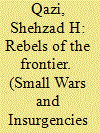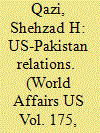|
|
|
Sort Order |
|
|
|
Items / Page
|
|
|
|
|
|
|
| Srl | Item |
| 1 |
ID:
118887


|
|
|
| 2 |
ID:
107898


|
|
|
|
|
| Publication |
2011.
|
| Summary/Abstract |
The Pakistani Taliban, factionalized into some 40 groups, form a decentralized insurgent movement, often characterized by infighting, divergent motivations, and a shifting web of alliances. The Pakistani Taliban remain little understood because most scholars have avoided a serious treatment of the insurgent movement and instead focused on analyzing the geopolitics of the region and Pakistan's 'double game'. This article seeks to fill this gap by dissecting the movement through selected theories of organization and mobilization. First, I explain the various dimensions of the conflict and the origins of the insurgency. Next, I discuss the Pakistani Taliban's political organization, categorizing it as composed of various warlord regimes. I further list the Taliban's component groups and numerical strength and chart the leadership structure. Lastly, I analyze insurgent recruitment strategies, accounting for the role of selective incentives, coercion, and genuine grievances.
|
|
|
|
|
|
|
|
|
|
|
|
|
|
|
|
| 3 |
ID:
115081


|
|
|
|
|
| Publication |
2012.
|
| Summary/Abstract |
The last calendar year was by far the most tumultuous in a decade of tense and mistrustful relations between Pakistan and the United States. It began with CIA contractor Raymond Davis shooting and killing two Pakistanis in broad daylight in Lahore, then only worsened in May when Osama bin Laden was found and killed in a US raid at a compound near the Pakistan Military Academy in Abbottabad (an episode that severely angered Pakistanis and embarrassed the Army, which was domestically seen as unable to secure the homeland against foreign intrusion and internationally suspected of providing refuge to America's worst enemy). Tensions escalated further as the US began pressuring Pakistan to attack the Haqqani Network (HN), a Taliban group with safe havens in North Waziristan. Pakistan refused, and crisis hit when the HN launched a twenty-two hour assault on the US Embassy and NATO headquarters in Kabul. An infuriated Admiral Mike Mullen, outgoing chairman of the Joint Chiefs of Staff, lashed out against Pakistan, saying the HN was a "veritable arm" of Pakistan's Inter-Services Intelligence (ISI) agency. Weeks of diplomatic efforts finally thawed relations, but just as the situation stabilized, a NATO attack on a Pakistani checkpoint in Salala in late November threw the relationship into a tailspin. Twenty-four Pakistani soldiers died in the two-hour assault. Pakistan was furious, immediately suspending NATO supply lines and boycotting the Bonn conference on Afghanistan held in early December.
|
|
|
|
|
|
|
|
|
|
|
|
|
|
|
|
|
|
|
|
|